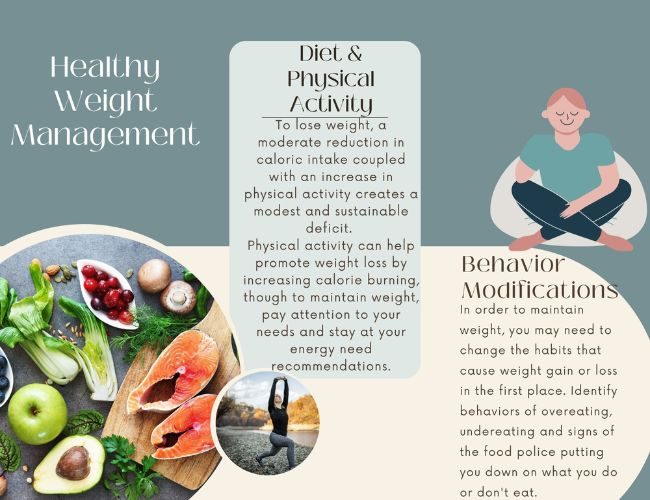Nutrition Tips for Better Weight and Metabolic Health
Today, being at your best health and wellness is a greater priority. For most people, keeping weight in balance is a key factor in this process. But having an ideal weight is more than just the number on that scale; it’s really about a better understanding of a person’s nutritional body needs, adopting sustainable habits, and enjoying a proper balance of life. Learn through this blog how nutrition can be an effective tool in achieving and maintaining sustainable weight and exposure to necessary foundational principles on metabolic health, personalized diet plans, and chronic weight management.
1. Nutrition's Role in Weight Management

Nutrition is often overlooked in weight loss journeys, with many people focusing only on strict calorie counting or intense workouts, forgetting the vital role of nutrition. Nutrients are essential to your body’s metabolic functions, determining how energy is stored and used.
A balanced intake of nutrient-dense, calorie-conscious foods can significantly improve metabolic health. Nourishing your body with vitamins, minerals, and essential macronutrients is crucial for well-being. Prioritizing nutrition over mere calorie restriction can lead to healthier, more sustainable weight loss, reducing the frustration and fatigue that often accompany dieting.
For optimal weight management, identify foods that maximize your body’s energy-burning potential. A diet rich in complex carbohydrates, healthy fats, and lean proteins not only fuels your metabolism but also keeps you satisfied throughout the day. This approach shifts the focus from restriction to nourishment, supporting a healthier, more balanced lifestyle.
2. Metabolic Health: The Key To Long-Term Success

Long-term weight loss maintenance relies on metabolic well-being besides just losing weight. It’s more of supporting a metabolism that is well-absorbed with nutrients, keeping weight stable. A healthy body, well-nourished, with a balanced metabolism, helps in sustainable weight management.
Focusing on metabolic health means fueling your body optimally. This involves choosing nutrient-dense foods like leafy greens, whole grains, and lean proteins, while avoiding excess sugars and unhealthy fats. Prioritizing nutrition for metabolic health makes weight loss not only achievable but also sustainable.
Consistency is key. Ditch the fad diets or skipping meals, as this unsettles your metabolism, whereas multiple small, frequent meals lead to leveling blood sugar levels and sustained energy. When nutrition and metabolic health are aligned, your body is set up for the long term.
3. Tailoring Diet Plans: Acceding to Individual Needs

Nobody’s bodies are the same. Effective weight management only works when personalized. If there were a one-size-fits-one diet, you could tailor what you eat so as to suit your life, preferences, and unique health needs. This individual approach can only help you have a better relationship with food and support you in making informed decisions that can help with sustainable weight management.
It points towards the different foods that your body would consume that you respond well to, which will definitely help you steer clear of the common pitfalls many dieting individuals often encounter, such as binge eating or feeling overly restricted. Choosing the right portions and variety of foods is easy, as the balance of a diet relating to weight management as well as the general well-being of an individual is supported. A nutritionist would help you design a perfect plan that will fit all your needs and goals, which will get you the best results from your nutrition journey.
4. Long-Term Weight Control: Creating Healthy Habits

Weight management is not a destination, it’s a journey. Long-term control of weight is about shaping habits you can maintain life long, not until the scale indicates something that you want to see. Having time to ingrain these practices into daily living is what eventually yields the benefits worth the effort. So the nutrition program becomes a lifestyle, not some quick fix that sets you up for success.
They are:
Some tips include mindful eating, taking part in regular physical activities, and keeping stress levels under control. Being mindful about what one eats prevents unwanted calories from coming into the system and fosters a healthier attitude towards food. Fitness complements nutrition through calorie burning and the balancing of the metabolism. Lastly, managing stress is crucial because stress can stimulate emotional eating, which further affects weight management.
These practices, combined with a balanced approach to nutrition, and commitment to long-term weight control, make a solid foundation for true health and wellness.
5. Common mistakes in the management of weight and how to avoid them

While nutrition and habit-building are still important, common pitfalls to avoid during one’s weight management journey may be more informative. Most people unknowingly make choices that work against them. For instance, when using foods that are low-calorie, low-nutrient give you no satisfaction, which later makes you increase over your threshold to eat more.
Another common blunder is skipping meals or adopting fad diets. Skipping meals may appear like a quick way to cut calories, but this often leads to crashes in energy and poor metabolic health. Fad diets restrict entire groups of food, which means that the individual will naturally experience a loss of nutrients and unsustainable results.
To achieve this, nutrition should be oriented towards whole, nutrient-dense foods and away from processed options. Additionally, customized diet plans will allow you to make adjustments as you find what works for you best and not based on the latest fad.
6. Integrating Nutrition in Daily Life

Nutritional balance toward sustainable weight management involves integrating healthy choices in your lifestyle. It begins with small steps, from adding fruits and vegetables to meals or reducing the intake of sugar. Generally, small steps lead to significant changes in health improvement over time.
Proper meal prep is an efficient strategy that will ensure that healthy meals are always within easy reach, far from the tempting, impulsive urges to buy fast food or snacks. Meal planning outlined in your diet plan helps you achieve your goal of managing excess weight while providing your body with essential nutrients.
Another simple and effective way to improve your nutrition is to have a balanced plate of portions of vegetables, proteins, and whole grains. All of these habits with a commitment to long-term weight control ensure you’ll maintain healthy weight without feeling deprived.
Conclusion
By embracing nutrition as the core aspect of your weight management journey, you’ll find more sustainable and effective results. The key takeaway here is that in focusing on metabolic health, creating a custom diet plan, and living long term to control weight, you’re setting yourself up for success. Weight loss isn’t about dieting at all but has everything to do with nourishing your body, making smart choices, and maintaining a healthy lifestyle. Fitrofy embodies promoting personal wellness through practical, sustainable methods that can easily be fit into daily life. Begin your journey today, with a focus on nutrition, incrementally acting your way to a healthy and happy life.
Prioritize health and well-being with an easy-to-use solution! The Smart Diet Planner supports daily wellness and energy. Discover the benefits of better health habits today.
Download now or reach out at dietitian@smartdietplanner.com |
+91-7037679715 | https://business.fitrofy.com/
